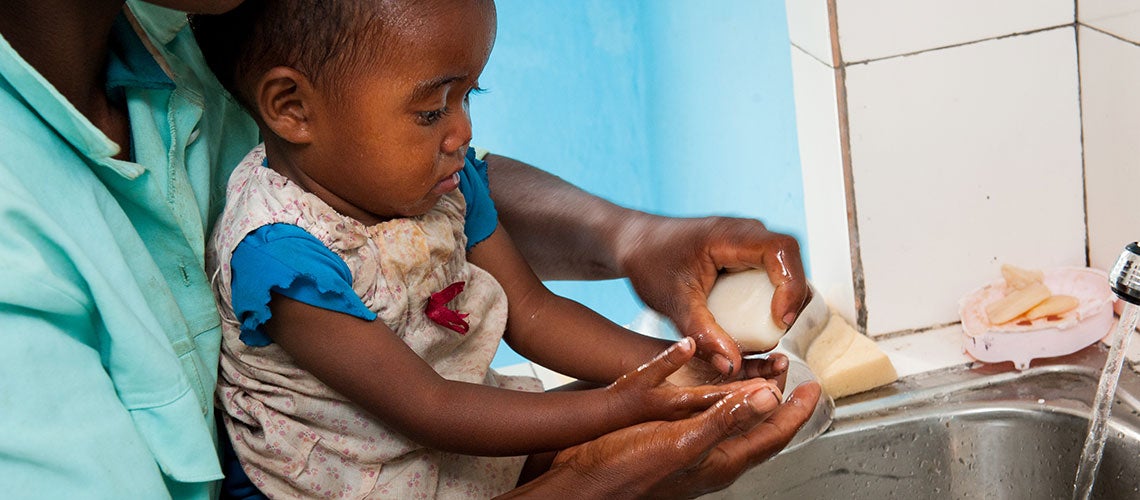 Coronavirus : le rôle des financements à l’appui des politiques publiques de développement dans la lutte contre la pandémie et la préservation du capital humain
Coronavirus : le rôle des financements à l’appui des politiques publiques de développement dans la lutte contre la pandémie et la préservation du capital humain
With Madagascar’s health system under strain from the COVID-19 pandemic and schools shuttered for the foreseeable future, the health, education, and overall wellbeing of the Malagasy people are increasingly at risk. As the pandemic hits more and more countries, the World Bank Group and other organizations like ours are stepping up to provide immediate support to countries in order to quickly get resources to the front lines of fighting this disease.
In Madagascar, we just approved an $100 million Development Policy Operation (DPF), which has been under discussion for several months. This kind of financing provides general budget support to countries engaging in policy reforms, and in Madagascar, the reforms are grouped into three pillars: better qualified human resources in the education and health sectors, more transparent and predictable financial resources, and stronger legal protections for women and children.
This operation was not designed with COVID-19 response as an explicit objective, but it can serve to stem the expected rollbacks in health and education in the country and protect the most vulnerable people in four ways:
- Expanding social safety nets to cover more of the poorest, who are about to be affected by an economic slowdown. One of the central policy reforms seeks to expand the coverage of the country’s social safety nets, using money from the public treasury. (To date, these programs have been financed by the World Bank.) An estimated 30,000 additional families will be protected thanks to the Bank’s financing.
- Better fund flows to the front lines will help under-resourced clinics provide basic services. As the International Monetary Fund recently noted, more health spending will save lives. The 3,000 clinics in Madagascar rarely have enough resources to ensure basic functioning, despite funds being earmarked for them in the country’s budget law. The Bank’s financing supports reforms in the health sector to remove bottlenecks in the flow of funds, so that frontline facilities have the budget they need to operate.
- Stronger legal protections against gender-based violence. There is evidence that, in times of crises such as Hurricane Katrina in the United States, or the Christchurch earthquake in New Zealand, gender-based violence increases. Madagascar’s new law on gender-based violence, passed in December 2019, provides stronger protections for women and children.
- Quick-disbursing budget support will help offset macro shocks with counter-cyclical financing. More resources to the country’s treasury will help ensure that essential services continue to be provided during the crisis, and emergency inputs (COVID-19 screening tests, ventilators and other supplies) can be purchased.
As mentioned, this operation wasn’t designed to respond to COVID-19, but it offers the flexibility to support Madagascar during the pandemic. How can future DPFs be designed to help mitigate the pandemic’s impacts on human capital? Some early ideas:
- Pandemic Response Plans, whether sectoral, or government-wide. Governments worldwide are putting in place pandemic response plans. The focus includes policies on screening, case management, quarantine, and other measures for public safety. The endorsement and activation of these plans could be part of the reforms that DPFs support.
- Policies that extend safety nets to be more shock-responsive, including through school feeding. In Madagascar, for example, safety nets will be a primary tool for protecting families who experience shocks from COVID-19. Similarly, for many children, schools represent not only a source of learning, but also of nutrition. Policies for keeping/expanding school meals could be considered, as is being done now in Ghana.
- Policy frameworks for education service delivery when schools are closed. For more developed contexts, this could mean negotiating free data plans with telecom providers, or free access to certain websites that offer education content. This has been recommended for countries in Europe and Central Asia. For lower-resource countries, this could include measures like new radio instruction programs, or the broadcasting education content via national television.
- New programs targeted to parents in their role as stand-in educators. These programs could be delivered via SMS or WhatsApp, including weekly instructions or tips (structured by age or grade level) on what parents can do to help ensure that their children continue learning. Simple versions of such programs aiming to increase reading at home have shown large impacts.
The pandemic’s effects will be felt deeply and broadly, but how long the effects last will depend on our ability to protect people’s health, education, and skills. As with all pandemics, uncertainty predominates. But one thing is clear: DPFs will be an important part of the World Bank Group’s COVID-19 response. As these operations are designed, we will continue to help our clients include measures that #InvestInPeople, so that this global challenge doesn’t become a human capital crisis for generations to come.


Join the Conversation